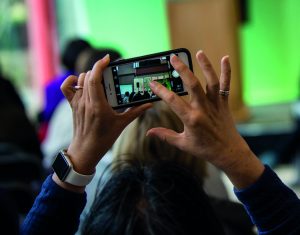An ADED instructor, Douglas Mauger, sent an in-depth and thought provoking article to our department on how students are distracted by the use of tech in the classroom vs. how instructors see it being used. The article, A Mixed Blessing? Students’ and Instructors’ Perspectives about Off-Task Technology Use in the Academic Classroom states that “There is no consensus on whether or not the introduction of technology into academic classroom brought with it substantial benefits to learning” (Neiterman & Zaza, p. 1). However, the consensus is that the opinions between students and instructors on tech use in the classroom are divided.
Of course the divide is based on the students feeling “that it is their choice to use the technology, they saw it as the instructors’ responsibility to motivate them not to use it.” (p. 10) and that “Humor is always good, if you are laughing, you want to hear more and be more engaged” Instructors, on the other hand, stated that “we cannot compete with an industry that has billions and billions of dollars” (p. 11) which is in reference to students watching YouTube in class and using SNS. Another instructor agrees that sometimes material is “not super juicy…. [but] you have to drive through it. That’s the point.” (p. 11). This divide brings us to the real question: “Learning how to focus on the tasks that do not spark a lot of interest in students” (p. 11). But, is this the responsibility of instructors? The article asks, is being able to focus one of those unstated competences that we should be able to facilitate in this education?
How do you approach technology, or the misuse of technology, in the classroom? Do you feel it’s your job to enforce strict rules to improve your students’ attention spans, such as confiscating them when they become a distraction? The article concludes by saying “Having an open discussion with the students about the use of technology in the class can help both students and instructors to set up joint expectations about the use of technological devices in their course” (p. 13). Or, perhaps this reflects today’s board room meeting and classroom rules have to catch up?

